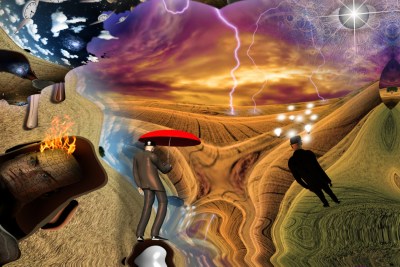Quarter II — 2022 | Why Not Experiment?
Not for the Faint of Heart: Opening to a New Renaissance
By Tricia Stewart Shiu
Not for the Faint of Heart: Opening to a New Renaissance — Read by Tricia Stewart Shiu
 Where, exactly, are we now? How do we even begin to locate ourselves within the universe—let alone, stay present with it? With all the timeline jumping, thought bouncing, multiverse excursions, it’s virtually impossible to imagine a personal alignment or even orientation, given the current state of world affairs…
Where, exactly, are we now? How do we even begin to locate ourselves within the universe—let alone, stay present with it? With all the timeline jumping, thought bouncing, multiverse excursions, it’s virtually impossible to imagine a personal alignment or even orientation, given the current state of world affairs…
ARTISTIC ALLEGORY | LE MOT JUSTE
Perhaps, orienting ourselves is not the point. Old ideologies are falling away and are being replaced by new ones. With that, conflicts arise, and battle lines are drawn. Managing the day-to-day tasks while the world churns out its next iteration can be quite tumultuous. Many would argue that merely staying present is enough to glean a mere morsel of “be here now” existence and shift away from stress or struggle. They could have a point.
Proponents of mindfulness, say that research suggests that when we turn towards pain and discomfort and remain present, we can experience less of it.

Evan Forman a Psychology Professor at Drexel University defines this method as, “Present-moment awareness,” which, generally refers to a “state of sustained attention to and awareness of the present moment, which includes being fully aware of one’s internal experiences.” These “internal experiences include factors like sounds, smells, and sensations, as well as thoughts and emotions.”
Anyone experiencing anxiety or discomfort can attest to the benefits of mindfulness. It can offer calm in the midst of a severe personal storm. However, this tool offers support temporarily and the act of sustained presence takes extensive practice (like meditation and/or yoga). Plus, anyone who enters into the rabbit hole of higher consciousness can find themselves in an entirely new, unexpected (and perhaps, unwanted) inner space.
Some would even go as far to say, mindfulness and remaining present, might not be the best long-term solution. In fact, one scientist has declared that “being in the present moment is no joke.”
Ruben Laukkonen, a cognitive neuroscientist at the VU University of Amsterdam, has been researching the effects of the rarest states of human consciousness and has unearthed some unconventional theories about being present and its effects on our well-being.
 His primary reason for nixing extended presence practice is based on a simple frame that everyone consistently uses—time.
His primary reason for nixing extended presence practice is based on a simple frame that everyone consistently uses—time.
“Because,” Laukkonen reasons, “what concept, feeling, or experience, is not built on the foundation of time?”
Laukkonen sites personal safety as a basis for tempering a “presence-centered” mindset. He suggests, “…how do we know the taste of a good coffee, recognize our mother, or open a door without a vast history of learning based on the past? How do we drink water, instead of detergent, unless we project our knowledge all over that neutral liquid?”
In truth, Laukkonen concludes, “To truly be in the present moment is to not exist.”
He, most certainly, has a point.
So, what is the point? Best case scenario, a happy medium is drawn between far out in the universal consciousness and almost non-existent presence, and we can, finally, experience our world to realistically, subjectively enjoy the coffee flavor of our choice, maternal recognition, opening a door, and discerning water from detergent.
If anything, consider this your official call to stop beating yourself up about not being present at every living, breathing moment of the day. Who knows, with all that free time, you might just begin to enjoy yourself.





